Ian Boswell Climbs Back
Pro Climber Ian Boswell has ridden some of the world’s toughest roads, battled injury and faced the world tour peloton in all its pain and glory. We sat down with him to talk about his bad crash early this season, recovery in Vermont and who is coming to his very own Peacham Fall Fondo.
BY BENJAMIN GLASS
On the last Saturday in June, Ian Boswell of Peacham, Vt. tackled Lincoln Gap the way any other cyclist would: out of the saddle, head forward, heaving his upper body side-to-side like some sort of amphibian wading upstream. I lingered at the Mt. Abraham trailhead parking area, watching packs of cyclists ascend Lincoln Gap, one of four gaps some would ride in the 108-mile Vermont Gran Fondo, rightfully advertised with the slogan “ride it if you can.” It was no surprise that Boswell was the first to come into sight, initially just as a slender, palpably-fatigued rider; he looked no different than any other fondo-ist struggling up the steepest paved mile in America. Except that he was wearing the logo-emblazoned kit of a world-class pro bike racer.
A year ago, on July 7th, 2018, clad in the same crimson and robin’s egg blue kit of Team Katusha-Alpecin, Boswell was pedaling the streets of Noirmoutier-en-l’Île, the small island commune off the west coast of France with a pack of the world’s best cyclists at the start of the 105th Tour de France. After five years racing with the best-known, best-funded team in bike racing, Britain’s Team Sky, Boswell had joined the Russian-Swiss backed Katusha-Alpecin team, hoping for a chance to ride the Tour de France. The 23-day, 2,200-mile race circumnavigates France and features legendary climbs such as the 12-mile, 8-percent grade Alpe d’Huez and the similarly intense Col du Tourmalet in the Pyrenees. It’s a race where 10 or 20 percent of the pack often doesn’t finish. In 2018, Boswell was only one of four Katusha-Alpecin riders to finish the entire race, which ends, historically, on the Champs Élysées in Paris. Of 176 starters, the climber from Vermont crossed the final line in 79th place in the general-classification, finishing the stage race about three hours behind the winner, Team Sky’s Geraint Thomas.
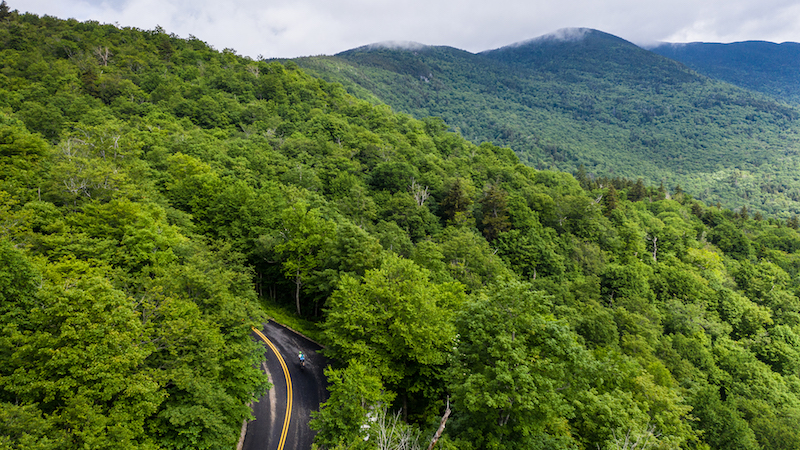
Two years ago I found myself dripping with not only sweat, but tears of pain as I made my first attempt up the east side of Lincoln Gap. Today, I waited patiently to see Boswell summit. At some point I recognized him; maybe it was his pale complexion, or his powerful upright stance, or the crimson helmet that popped among the lush forest greens set behind him. That’s Boswell, I thought. That’s him for sure.
The pro rider tangoed with the 15-percent grade, somehow without a loud whistle from his lungs, nor a mechanical creek from his chain. The only sound was just the whooshing sound of his wheels spinning on the wet asphalt, subtle enough to blend in with the pitter-patter of the morning rain. His squeaky-white shoes spun with grace, his quads and calves pushed with grit, and in all but ten seconds, Boswell was out of sight, and the boreal peace returned to the mountain road, with nothing but the sound of blue warblers to reverberate on the blacktop below.
Crashing Out
If all had gone as planned, Ian Boswell would not have been leading a group of recreational riders up Lincoln Gap last month. He would have been in Brussels, Belgium getting ready for the start of his second Tour de France. Boswell’s 2018 UCI results would have certainly secured him a spot in Katusha-Alpecin’s Tour roster for the July, 2019 race. Boswell’s early season looked promising, as he competed in Mallorca’s Trofeo Palma in early February, the six-stage Tour of Oman later that month, and Tuscany’s famous Strade Bianchi on March 9th.
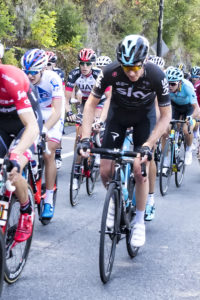
However, on March 16th, Boswell crashed out in stage 4 of the Tirreno-Adriatico for a reason that is still unknown to him.
“We were on a downhill, and whether someone overlapped my wheel or I hit something in the road, I went over the bars and landed on the back of my head. I was unconscious for about a minute,” he said. “When our team director came to me and said I needed to get into the ambulance, I was like ‘oh no, I’ll get on my bike and ride down the hill to the finish,’ which I thought was two miles away. We still had 60 miles to race. I was so unaware of what happened.”
This was Boswell’s sixth concussion, however one of the first that he has ever been seriously treated for. After one crash, his head was so swollen he had to cut foam out of his helmet to fit it on. Still, his team coach back then put him back in the race. “That’s how it used to be, you just kept on riding,” says Boswell. This time, he was sent to a hospital in Urbino, Italy, then to a specialist in Nice, France, and finally back to Vermont, where Dartmouth-Hitchcock doctors almost immediately put him on active-recovery. Dr. Kristine Karlson, the physician at Dartmouth-Hitchcock who treated Boswell, and an Olympic rower herself, says concussion treatment has drastically changed.
“Five or ten years ago we were saying, ‘Lay low until you are better,” she said. “Research has really changed that. The current guidelines are that you need to get out of your ‘cocoon’ as soon as you are able to tolerate it, and that exercise actually helps people get better.” Dr. Karlson says the standard of care is 48 hours of rest, followed immediately with active recovery. “There is great evidence that if you lay low, it takes longer to get better.”
The Vermont Gran Fondo was one of the first semi-competitive rides Boswell had done since his crash three months before. “My vision is still not right,” he says. “I see weird things pop into my peripheral view.”
On the day of the Fondo, Boswell was monitoring his symptoms, gauging his fitness after three months of a relatively lighter training regimen. His wife Gretchen Kaija (they were
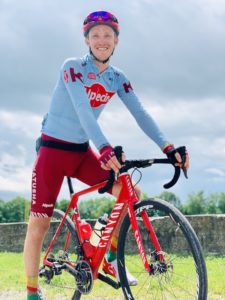
married May 25 of this year) was waiting at the finish line for his arrival. “He’s set back and he knows he is set back, she said. “Ian is just trying to find his confidence again.”
It was mid-afternoon when Boswell pulled into the parking lot. Clicking out of his pedals, he exhaled “Holy crap…”
“How are you feeling?” Gretchen asked, with a concerned look.
Then, like any other cyclist who has ridden a century, Boswell said: “I need food.”
After he had changed, I met up with Boswell and his wife Gretchen in the Fondo tent set up near the food trucks. Boswell was wearing a long-sleeve flannel, nursing Stowe Cider from the can. The food trucks had begun taking orders; the live band was tuning up, about to play. It was sunny and warm and the post-race party tent was filling with many other riders, similarly empty-tanked, similarly drinking ciders and beers.
For a pro like Boswell, post-race idling can lead to swarms of fans asking for autographs and photos.
“In Japan, he even had a teenage girl knock on his hotel room door and ask for his sweaty jersey,” Gretchen said with a wry smile. Here, no one seemed to recognize Boswell, or care.
One of my first questions for him was how he had enjoyed his ride up Lincoln Gap. “Lincoln Gap is such an intense pain,” he said. “There are very few climbs that I’ve ever raced that are that steep for that long.” Boswell was riding a Canyon bike using a SRAM 12-speed, with the smallest gearing at 37-tooth in the front and a 28-tooth cog in the back: about a 1.3/1 ratio.
“I was in that [gearing] pretty much the whole climb, but I could have used a smaller gear. That’s part of the reason I went hard; I just had to keep the bike turning. Lincoln Gap is just like a bee sting, whereas most hors-categorie climbs are like a mosquito bite—they don’t hurt as much at first but the pain keeps bothering you.”
To make matters worse, Boswell, in the lead, had taken a wrong turn and ended up riding Lincoln Gap twice, first west to east, then after realizing his mistake, turned around and rode it east to west. Still, he rode up the timed east side section in 10:48, the fastest time of the day, earning him the Fondo KOM.
Boswell is no stranger to quick, intense efforts. On Stage 12 of the Tour de France, Boswell put out 400 watts for six minutes at the base of the Col de la Madeline and averaged around four watts per kilogram on Alpe d’Huez on the same stage.
While it was clear Boswell had felt the pain during the Fondo, he was also excited to be riding with other cyclists again.
“The best part? Four or five of us were coming down Route 100,” he said. “We were just rotating in a pace-line, drafting—it’s the first time I’ve done that since my crash in March. It was fun to feel that thrill of riding in a group again. I always love riding in these types of events, where you meet different people. When you are racing, you’re surrounded by the same group of riders your entire career. Often, we are in this professional bubble.”
The Rising star
Ian Boswell grew up in Bend, Oregon and moved to Peacham with Gretchen, a school teacher from Reading, Vt. whom he’d met through mutual friends in 2015.
“I’ve always wanted to live in a rural setting where I could have some land to garden and play [with],” said Boswell. “We found that here in Vermont, a place where humans live with nature and there is a real connection to the land and community.”
At 28, he is currently one the most promising American riders on the World Tour circuit. On top of completing all three Grand Tour stage races (the Tour de France, Giro d’Italia, and Vuelta a España), he’s raced the Tour of California five times and the Paris-Nice three times. Boswell has achieved seven top-ten general classification results in tours across the world, including 7th and 5th overall in the 2015 and 2017 Amgen Tour of California, and took the overall bronze medal at the Tour of Utah in 2010 as a U23.
In 2010, Boswell started his career as a member of Bissel, a UCI continental team that competed in USA Cycling races. He bounced around from team to team, including Argos-Shimano, until landing on Team Sky in 2013, a team known worldwide for its dominance in the pro peloton.
“Sky is the pinnacle of pro cycling,” he said. “I learned a lot racing there. They are always pushing forward. It’s the way modern sport needs to be; you can never be content with where you are at.”
Boswell spoke about how funding directly impacts training opportunities, especially for Team Sky.
“With Team Sky, it was like, ‘We are going to altitude as a team, with massage therapists, mechanics, follow cars, and [other] support. If you add it up, it becomes a $50,000 trip,” Boswell said. Katusha-Alpecin is not as well funded. “Last year before the Tour de France, Gretchen and I went up to altitude in Livingo, Italy. It was my choice to go there for my own preparations, so it meant doing everything ourselves: renting the car, getting hotels, food and gas,” he recalls.
For the five years Boswell was with Team Sky, he never made the Tour de France roster. In 2018, Boswell agreed to step away from Sky and join Katusha-Alpecin, knowing he might have a better chance of earning a spot in the world’s greatest cycling race.
Of course, the roles on team Sky and Katusha-Alpecin are much more strategic than every man playing for themselves. The majority of Boswell’s grand tour performances have been as a domestique for team leaders. At Sky, he rode for England’s Chris Froome, four-time winner of the Tour de France, and the Welshman, Geraint Thomas, the 2018 Tour de France winner.
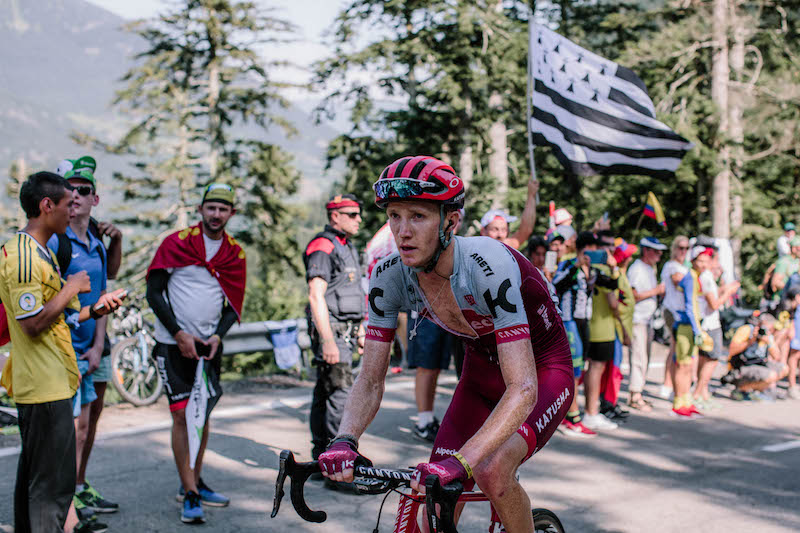
Boswell’s time at Katusha has been no different, riding to support Russian team leader Ilnur Zakarin in every facet, from fetching him water bottles to “pulling” him up through the French Pyrenees (there’s a picture on Boswell’s Instagram of him grimacing in pain while Zakarin drafts behind him on the Col du Tourmalet).
Boswell rides in a peloton that consistently averages 26 miles per hour on grand tour stages.
Boswell can personally maintain over 400 watts for an hour and piles up hundreds of miles of riding per week during the race season (an average of 15,000 miles per year according to his Strava profile). The top speed he’s ever gone is over 70 miles per hour (in the Tour of Utah), and he burns 3,500-4,000 calories on a single ride.
In February 2016, Boswell had the opportunity to train with Sky teammate and friend Chris Froome on a three-week, one-on-one training camp that Sky hosts every winter for a fellow rider of Froome’s choice. It was Boswell’s turn that year.
“Froome asked me to come to South Africa and I couldn’t really say no,” said Boswell. Along with the two of them, Sky sent the essential personnel: a private chef, massage therapist and bike mechanic. The duo did around 65 hours of cycling over their three weeks, “the most I had ever done,” said Boswell. He was also able to witness up-close how Froome, a man with 17 grand tour wins to his name, operates on a day-to-day basis.
“I saw the work that [Froome] did, and I was like ‘this guy is crazy,’” said Boswell. He has so much dedication and desire [to win]. He’s won every race he can win, multiple times. There’s not a huge need for him to continue other than the fact that he’s driven to do that.” Through these one-on-one trips with other pros, training camps, and full seasons of UCI racing, Boswell has ridden and trained with some of, if not all of, the biggest names in today’s world of professional cycling.
When you ride at that level, it is hard to avoid the topic of doping, an aspect of cycling that not only has weakened the sport’s reputation, but also has caused, what Boswell calls, “doping speculation” in the world of the pro peloton.
“I think the problem with doping is that there are a lot of rumors. For example, if I train a lot for the next two months, don’t race, then come back and win a race, what is everyone going to say? People love to speculate about what everyone else is doing.”
In 2009, Boswell’s teammate-to-be Ilnur Zakarin was caught doping with an anabolic steroid and was banned from the 2016 Olympics. Boswell, who has roomed with Zakarin, once asked him about his choice to use performance enhancing drugs.
“[Ilnur said] he surrounded himself with the wrong people, trusted the wrong people and made a bad decision.” Boswell also mentioned that when he was training with his former teammate Chris Froome, doping was never brought up.
“There was no doping, nor was there talk of doping,” said Boswell. “I was lucky to be coming into racing in this post-Armstrong era when cycling has been cleaned up a lot. I’ve never been asked to dope or had to face that question.”
Training in Vermont
Life changes when Boswell goes home to Peacham, Vt., a town of 700 in the Northeast Kingdom. Here, he rides in and around the St. Johnsbury area, anywhere from 60 to 100 miles on a given day. He most often rides alone, but his current favorite training partner is 58-year-old, Fritz Fay. Raised in Jericho as one of 11 kids, Fay worked as a fifth-generation dairy farmer for most of his life. He now lives in St. Johnsbury where he works as an energy consultant.
“I was out on a road bike ride two years ago, on Father’s Day, and a rider came up behind me,” said Fay. “The rider was fully decked out in a Sky kit. Now, there are riders that are such fans of a cycling team that they will buy the kit, so I figured he was just one of those.
He only told me his first name, and he asked me what I did for a living. Eventually I asked what he did for a living, and he said he worked for Team Sky. I asked, ‘Are you a pro cyclist?’ and he said yes. I told him that I knew him; I was just floored I was riding with Ian Boswell.”
Fay said they began riding together, messaging over Facebook to schedule rides. “I figured we would ride once or twice, and then never again. I thought he would seek out riders that are more at his level. Somehow, we ended up riding a lot, and when he’s around, we ride a couple times a week.” Fay also said that Boswell’s fitness is so far beyond any part-time cyclist like himself. “There is just no comparison,” he said.
“Fritz is my number one training partner,” said Boswell. Although the two mainly just ride casually together, Boswell says their friendship has spilled over into other more utilitarian areas of life.
“He is such a wealth of knowledge,” said Boswell. “I’ve given him some bike parts, and he’s bucked up some logs for me.” Boswell has received advice and help from Fay on everything from how to properly maneuver a tractor to cutting down fallen trees.
Boswell’s unlikely relationship with Fay is a part of the much larger anomaly that Boswell seems to brush off; he lives out his offseason in the hills of rural Vermont on a 10-acre property in a town with a population of around 700. While most pros spend the fall and
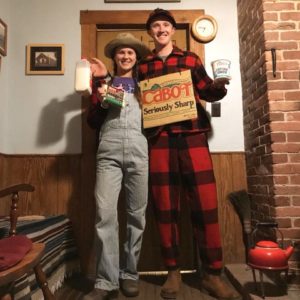
winter in the French Riviera or Catalonia, Boswell and Kaija settled in Peacham in 2017.
Boswell still has an apartment in Nice, France where he is based for the racing season, but for the most part, he prefers the life of a Vermonter. On Halloween, Boswell dressed up as Cabot Cheese, wearing red flannel garb from head to toe—“I owned all the stuff already,” he says with a laugh.
“He was Cabot Seriously Sharp last year,” Gretchen elaborates. Boswell and Kaija maintain a vegetable garden, with the hope of livestock…”in time,” mull their own cider, and bake their own bread. Boswell takes an all-natural approach to fueling on the bike as well.
“I always prefer to eat real whole foods on the bike; cookies, date bars, bananas… I think during the whole Tour de France last year I only had two gels.”
Boswell’s life in Peacham does not mean he takes a lot of time off the bike. During his off season, which usually runs from the end of October until team camp in December, Boswell spends around 20 to 30 hours a week doing on-the-bike training, in the winter months mainly on a trainer, on top of hours of weekly stretching and gym workouts.
“I did a bunch of riding last winter on my home trainer, and it is mind numbing,” said Boswell. “But it has to be done.” However, he gets out to ride in the Northeast Kingdom whenever he can, a place he says reminds him of his hometown of Bend, Oregon. “In the Kingdom, you are never confined in a valley, and when you are on these big rolling hills, you can see forever.”
It was at some point in his first months in Peacham that Boswell decided it was worth showing the Kingdom to other cyclists.
The Peacham Fall Fondo
Enter Boswell’s own creation: the non-competitive Peacham Fall Fondo, a ride featuring roads in and around his home town. Last October for the Fondo’s maiden event, 185 riders registered. This year’s second annual fondo, scheduled for September 21, will feature a new kids’ ride and a few extra miles on the road ride.
Boswell expects around 200 riders. The 50-mile ride is a fundraiser for Kevin Pearce’s Love Your Brain Foundation, a non-profit organization that supports people who have suffered traumatic brain injuries. Kevin Pearce is an ex-pro snowboarder raised in Vermont, who suffered severe brain damage from a half-pipe crash in preparation for the 2010 Vancouver Olympics.
“We’re trying to keep the Fondo community-oriented and very personal,” Boswell said. “Vermont has plenty of really big cycling events, [like] Rasputitsa and Overland. There are these big epic rides, but that’s not our ride. If we can just get more people riding bikes and enjoying a fun event that is not too extreme, that’s our goal.”
Boswell and Kaija also emphasized the power of community in making the event possible.
“The community of Peacham ran the event,” said Kaija. “The Peacham Fire Department helped out, the Peacham Elementary School hosted a stop, the Peacham Church donated tables and chairs, the Peacham Café offered coffee, the Peacham town hall supplied our power, the library hosted the apple pie stop—It is literally the community hosting this event.”
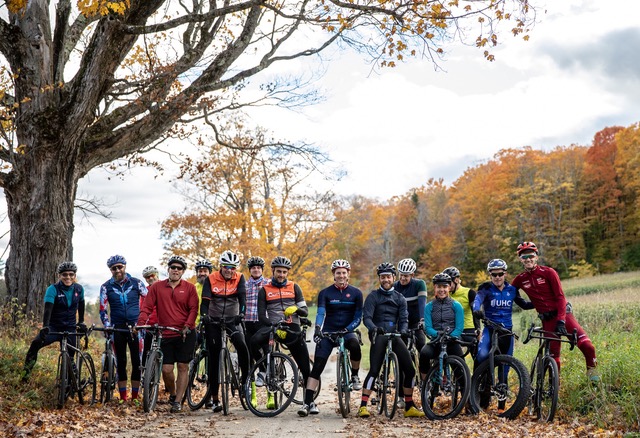
Boswell did admit that he was unsure about how the town would view the event at first. “I’m not from Vermont, so I guess I was worried whether this was a positive experience for Peacham. After the fondo, someone came up to me and said, ‘So you’re going to do this next year?’”
This year, the event is on again for September 21, when Boswell hopes to be back in race form. On July 21, he joined former pro cyclist and Tour de France veteran Ted King in riding in the Farm to Fork Fondo’s Champlain Islands event, a ride put on by yet another Vermont-based former pro, Tyler Wren. Boswell was scheduled to go back to Europe and rejoin the team at the end of July and hopes to ride with Katusha-Alpecin around the streets of Quebec on September 13 and Montreal on September 15 in the Grand Prix Cyclistes, a UCI World Tour event.
“I’ve invited Ilnur and the team to our Fall Fondo ride in Peacham. It’s a perfect opportunity to bring some of the riders from Montreal down to our event,” said Boswell, noting Peacham is only three hours south of the city. “I have all sorts of friends in the World Tour that would love to check out our place.”
Boswell’s embrace of community-based cycling runs right at the heart of what the sport is for so many people. In this way, it seems like there are two sides of Ian Boswell. The first is his professional career, and at a ripe age of 28, Boswell could keep getting better and better for years to come, possibly working his way up to the World Tour leaderboards. On the other hand, Boswell sees beyond his own “notoriety,” as he says, and is searching for a humble life in the Green Mountain state, where he can enjoy his beloved sport with his own community.
“As you get older you kind of start to value who you are as a person and not what your accomplishments are,” he said. “People in Vermont in general judge me as a person and how involved I am in my community. This is something I really admire.”
Ian Boswell continues to recover from his crash in March and is currently working with Gretchen to host their second annual Peacham Fall Fondo Sept. 21, 2019, presented by Wahoo Fitness. peachamfallfondo.com.
Featured Photo Caption: In 2018, Boswell was one of four riders on team Katusha-Alpecin to complete all 21 stages of the grueling Tour de France. Photo courtesy Katusha-Alpecin

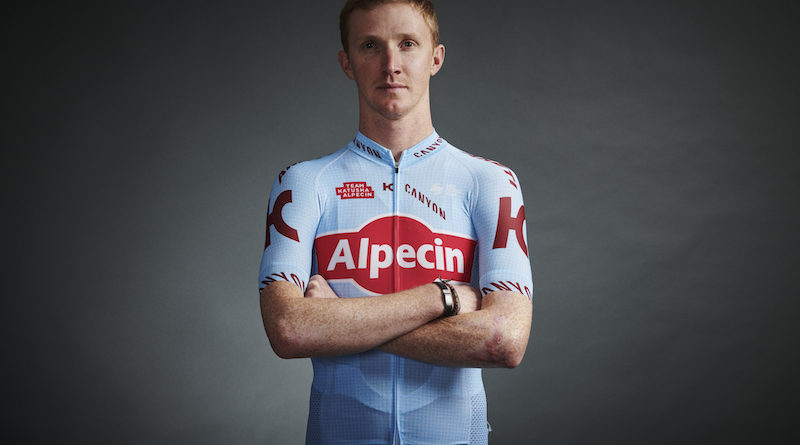
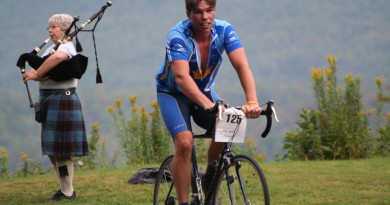
Ben Glass is a talented writer (and rider). Some impressions from the article. I am excited to ride the Peacham Fondo. I am psyched that a TdF rider thought Lincoln Gap is the toughest climb he has done. I love riding in VT and am excited to learn of all the riding opportunities and professional racer involvement.
Pingback: VT SKI + RIDE WINS GENERAL EXCELLENCE – VT SKI + RIDE